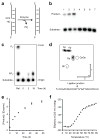Selection and evolution of enzymes from a partially randomized non-catalytic scaffold
- PMID: 17700701
- PMCID: PMC4476047
- DOI: 10.1038/nature06032
Selection and evolution of enzymes from a partially randomized non-catalytic scaffold
Abstract
Enzymes are exceptional catalysts that facilitate a wide variety of reactions under mild conditions, achieving high rate-enhancements with excellent chemo-, regio- and stereoselectivities. There is considerable interest in developing new enzymes for the synthesis of chemicals and pharmaceuticals and as tools for molecular biology. Methods have been developed for modifying and improving existing enzymes through screening, selection and directed evolution. However, the design and evolution of truly novel enzymes has relied on extensive knowledge of the mechanism of the reaction. Here we show that genuinely new enzymatic activities can be created de novo without the need for prior mechanistic information by selection from a naive protein library of very high diversity, with product formation as the sole selection criterion. We used messenger RNA display, in which proteins are covalently linked to their encoding mRNA, to select for functional proteins from an in vitro translated protein library of >10(12 )independent sequences without the constraints imposed by any in vivo step. This technique has been used to evolve new peptides and proteins that can bind a specific ligand, from both random-sequence libraries and libraries based on a known protein fold. We now describe the isolation of novel RNA ligases from a library that is based on a zinc finger scaffold, followed by in vitro directed evolution to further optimize these enzymes. The resulting ligases exhibit multiple turnover with rate enhancements of more than two-million-fold.
Figures




Comment in
-
Biochemistry: designer enzymes.Nature. 2007 Aug 16;448(7155):757-8. doi: 10.1038/448757a. Nature. 2007. PMID: 17700683 No abstract available.
References
-
- Schmid A, et al. Industrial biocatalysis today and tomorrow. Nature. 2001;409:258–268. - PubMed
-
- Cherry JR, Fidantsef AL. Directed evolution of industrial enzymes: an update. Curr Opin Biotech. 2003;14:438–443. - PubMed
-
- Panke S, Held M, Wubbolts M. Trends and innovations in industrial biocatalysis for the production of fine chemicals. Curr Opin Biotech. 2004;15:272–279. - PubMed
-
- Bloom JD, et al. Evolving strategies for enzyme engineering. Curr Opin Struct Biol. 2005;15:447–452. - PubMed
-
- Aharoni A, Griffiths AD, Tawfik DS. High-throughput screens and selections of enzyme-encoding genes. Curr Opin Chem Biol. 2005;9:210–216. - PubMed
Publication types
MeSH terms
Substances
Grants and funding
LinkOut - more resources
Full Text Sources
Other Literature Sources

